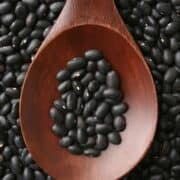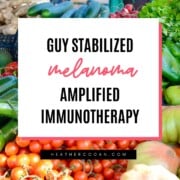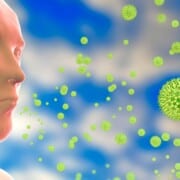Are you dealing with hot flashes? Feeling that not-so-pleasant rush of heat in your upper body, chest, neck, and face, or waking in a full-on sweat, is no fun at all. Your skin gets red and flushed, and you’re uncomfortable. There’s no way around it -- hot flashes are not our friend. But, what’s worse is when you’ve taken the steps to get control of this pesky symptom and you’re having no luck! You’ve had the hormone tests, and everything’s coming up roses. Or, you’ve gone onto hormone replacement therapy (HRT), but it’s not making an ounce of difference when it comes to your hot flashes. You might be surprised to hear it, but the cause of your hot flashes might be more about histamine than it is about hormones. Read on to find out how histamine can cause hot (and cold) flashes, and how you can finally get some much-needed relief.

QUICK REFERENCE
What is Histamine?
Although histamine is a much talked about subject, I’ll do a little recap on the role histamine plays in the healthy, well-functioning body. Histamine is a compound in our body that plays an essential role in our immune and digestive systems and acts as a neurotransmitter in our central nervous system (CNS) by communicating important messages from the body to the brain.
The complexity of histamine knows no bounds! Histamine affects the inflammatory process of the immune system but also plays a part in regulatory functions in the innate and adaptive immune responses. (1)
The inflammatory response happens in response to an antigen. Mast cells and basophils read the body’s IgE antibodies to learn what antigens they should be on the lookout for. They then release histamine and other inflammatory chemicals, which lead to a response from the body’s white blood cells, which will get to work getting rid of the specific antigens.
But, histamine is a compound that is pleiotropic due to the different types of histamine receptors in the body. Because of this, histamine promotes homeostasis in the body by a process known as immunomodulation, or the down-regulation of this inflammatory response, a key step of the immune response that prevents the body from attacking itself once the threat is gone.
Along with the role it plays in our immune response, histamine signals stomach cells to produce sufficient quantities of stomach acid for proper digestion, and plays a role in our CNS with respect to thermoregulation, and keeping our brains awake and alert.
Histamine and Body Temperature
So, now that you’ve had a refresher on what histamine does in general, let’s dive into how it can be at the root of your body temperature fluctuations. In order for our bodies to use histamine, it must interact with receptors throughout the body and brain. The main source of histamine in the brain is in the neurons of the tuberomammillary nucleus, which play a role in arousal, attention, energy use, feeding, and thermoregulation. (2) Research has shown that the preoptic area and anterior hypothalamus region (PO/AH) have a high concentration of histaminergic fibers and that it’s a region that contains temperature-sensitive neurons and regulates the thermoregulatory ‘set point’. It is in this area of the brain that histamine plays a role in hot or cold flashes.
In a study conducted in the mid-80s, it was found that when histamine was injected into the PO/AH, it induced hyperthermia, or an increase in body temperature, ie. a hot flash. On the contrary, when a histamine inhibitor was injected into this region, the reverse happened, and the body experienced a cold flash. (3) Additionally, research has shown that histamine, when causing an anaphylaxis reaction, affects the body temperature, blood pressure, and respiratory functioning. (4)
Histamine actions in the brain are typically excitatory and involve the H1 and H2 subtype histamine receptors. Because histamine influences thermoregulation by being active in regions that play a critical role in basal thermoregulation and fever response, if you are suffering from hot or cold flashes that cannot be attributed to hormonal imbalances, it might be time to explore if a histamine intolerance or an excess of histamine in your diet is a contributing factor.

Histamine and Menopause
Just to be clear, if I’ve made it sound like your hot flashes or temperature fluctuations are either the result of histamine or hormonal changes related to menopause, that wasn’t my intent. It’s possible that if you believe you may be going through menopause, but your hormonal tests suggest otherwise, then you might definitely be suffering from histamine intolerance and your symptoms may be lessened by taking the necessary steps to get your histamine levels under control.
If you are however in menopause and are undergoing HRT in an attempt to control symptoms and it simply isn’t working, you may be dealing with symptoms that are being aggravated by histamine intolerance, and that may be why the HRT isn’t taking care of the hot flashes.
But none of this is straightforward or hard and fast. When you take a look at the list of symptoms of histamine intolerance and menopause, you actually see a lot of overlap.
Some symptoms that are commonly seen with both histamine intolerance and menopause are:
● Hot flashes, night sweats, and an impaired sense of temperature
● Itching, rash, and skin flushing
● Insomnia and other sleep disturbances
● Headaches and migraines
● Racing heart or heart palpitations
And, as with all things, these symptoms may point to the same underlying conditions -- conditions that can exacerbate the symptoms of menopause or histamine intolerance, like leaky gut syndrome, hormonal imbalances, and autoimmune conditions.
To complicate matters further, women tend to have more histamine as a result of having more estrogen. Estrogen actually stimulates mast cells to produce more histamine, and if you’re suffering from estrogen dominance or you’re not producing enough of the enzymes your body needs to get rid of excess histamine, this can become a dangerous cycle of rising histamine levels and rising estrogen levels.
Need a place to start? You can begin to address issues of excess histamine by taking a few key steps. First, reduce high-histamine foods in your diet and focus on nutrient-dense whole foods. Work to balance your hormones naturally, and focus on reducing your cortisol levels by learning relaxation techniques, meditating, and improving the quality of your sleep. You can also look into working with a professional who can help you address histamine levels with appropriate supplements. If you put in a little effort, hot flashes can be a thing of the past!
Sources
- Castelo Branco ACC, Seiti F, Yamada Yoshikawa SF, Pietrobon AJ, Sato MN. "Role of Histamine in Modulating the Immune Response and Inflammation", Mediators of Inflammation, 2018;(10):2018.
- Gregorsson Lundius E, Sanchez-Alavez M, Ghochani Y, Klaus J, Tabarean IV. “Histamine Influences Body Temperature by Acting at H1and H3 Receptors on Distinct Populations of Preoptic Neurons”, J Neuroscience; 2010 Mar;30(12):4369-4381.
- Gatti PJ, Gertner SB. “The effect of intrahypothalamic injection of homodimaprit on blood pressure”, Neuropharmacology, 1984 Jun;23(6):663-70.
- Makabe-Kobayashi Y, Hori Y, Adachi T, Ishigaki-Suzuki S, Kikuchi Y, Kagaya Y, et al. “The control effect of histamine on body temperature and respiratory function in IgE-dependent systemic anaphylaxis”, J Allergy Clin Immunol. 2002 Aug;110(2):298-303.



















Comments
No Comments